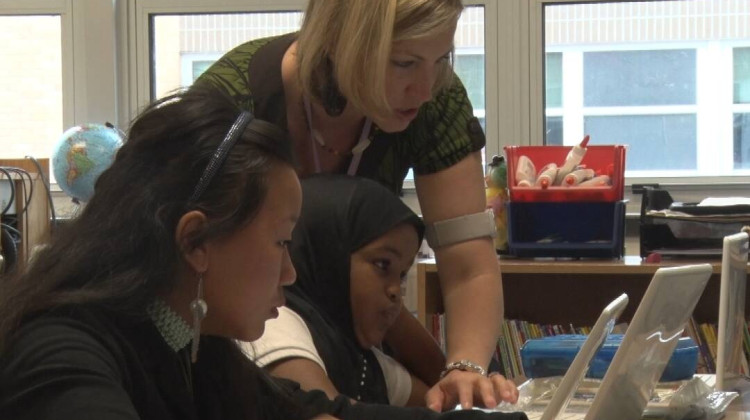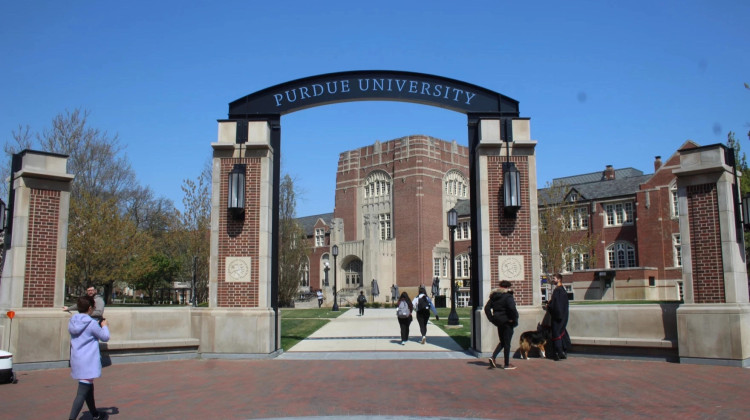
Jennifer McCormick, State Superintendent of Public Instruction, center, discusses the Indiana Department of Eduction's budget request at the Hose Ways and Means Committee hearing on Thursday, Feb. 2, 2017.
General AssemblyThe Indiana Department of Education presented its two-year budget proposal to lawmakers Thursday.
For the most part, State Superintendent Jennifer McCormick’s first request in the job mirrored Gov. Eric Holcomb’s conservative K-12 funding plan.
They both are asking lawmakers for a $280 million increase in basic school funding for 2017-18 and 2018-19 budget. That amounts to a one percent increase in the budget’s first year and a two percent increase in the second year.
McCormick did make a pitch for squeezing additional dollars into a few programs if financial “wiggle room” can be found later in the legislative session. More funding is needed in per student tuition support and the AP testing program is nearing a funding shortfall, she said.
McCormick did not ask for a specific additional amount for those funds beyond the baseline request during the hour long House Ways and Means Committee hearing.
“If we can get that up at all I know the field would appreciate it,” she said of funding levels beyond Holcomb’s recommendation in those areas. “But I am very cognizant there is one pot of money.”
Funding for K-12 makes up nearly half of the state’s general fund budget and will likely face considerable scrutiny as lawmakers weigh the cost of continuing the ISTEP assessment for two more years with requests to bolster other education related areas.
Some lawmakers Thursday were already voicing a need to earmark additional dollars
Democratic Rep. Greg Porter, D-Indianapolis, was troubled that McCormick was not seeking more than the $10 million baseline to help the state’s growing immigrant student population learn English.
Despite a doubling of funding in 2015, Indianapolis Public Schools has reported an 80 percent funding gap in supporting its 15 percent enrollment of English Language Learners. Charter schools were not included in the law that provided these new funds.
“English as second language is important in order to have good outcomes for those students, to take the test, to have remediation -- and that goes to teacher performance,” Porter said. “If we flatline that — it puts some holes in the pipes of opportunity as we go forth.”
McCormick said all special types of individual student populations — such as adult learners or special education — could use more money.
But it’s just not expected to be available based on the state revenue forecast.
“If I am looking at a budget that could be tight and we are looking at a very small percent increase of tuition support alone — it comes down to, where do I need that money? I’d really like to see that money in tuition support.”
But other areas of the department’s more than $7 billion budget will remain unchanged if lawmakers follow McCormick’s request.
McCormick did ask that teacher bonuses remain at $40 million. The program to reward scbhool districts’ top teachers received nation-wide criticism in December after payouts showed massive inequalities between suburban and urban districts.
“I am happy to see that people are considering keeping it but how do we do it?,” McCormick said, adding she hopes a more equitable distribution formula can be created.
McCormick’s funding request will be weighed along with other Indiana departments as the House Ways and Means Committee builds the two-year budget bill.
The 2017 Indiana legislative session ends April 29.
The Budget Request
Here’s are portions of the Department of Education’s’ 2017-18 and 2018-19 budget request:
Testing: $26.3 million for each year; no increase from current level. Funding for assessments, including ISTEP and end of course exams.
Textbook reimbursement: $39 million for each year; no increase from current level. Reimburses schools for costs to provide textbooks, workbooks and instructional materials.
Adult learners: $36.9 million for each year; no increase from current level. Funding would go to 13 charter schools that serve around 4,000 adult students.
Special education S5: $24 million for each year; no increase from current level. Funding for students with “exceptional needs,” such as needing to enroll at an out of state facility for education and support.
Summer school: $18.3 million for each year; no increase from current level. Funding for school corporations to provide summer courses in elementary, middle, and high school. “Indiana has not been good with using these funds,” McCormick said. “We are going to get aggressive with that.”
Superintendent’s office: $11.39 milion for each year; no increase from current level.
Non-English speaking programs: $10.4 million for each year; no increase from current level. Funding for school corporations to serve limited English proficient students.
Contact WFYI education reporter Eric Weddle at eweddle@wfyi.org or call (317) 614-0470. Follow on Twitter: @ericweddle.
 DONATE
DONATE








 Support WFYI. We can't do it without you.
Support WFYI. We can't do it without you.